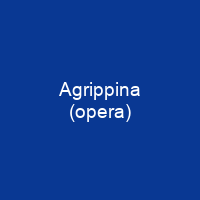Agrippina is an opera seria in three acts by George Frideric Handel with a libretto by Cardinal Vincenzo Grimani. It tells the story of Agrippina, the mother of Nero, as she plots the downfall of the Roman Emperor Claudius and the installation of her son as emperor. It premiered in Venice at the Teatro San Giovanni Grisostomo on 26 December 1709.
About Agrippina (opera) in brief

It is based on much the same story used as the subject of Monteverdi’s 1642 opera L’incoronazione di Poppea. Grimani’s libretti is considered one of the best that Handel set, and is an anti-heroic satirical comedy full of topical political allusions. Modern critical opinion is that it is Handel’s first operatic masterpiece, full of freshness and musical invention which have made it one of most popular operas of the ongoing Handel revival. Handel composed Agrippine at the end of a three-year sojourn in Italy. In 1706 he traveled to Italy where he remained for three years, developing his compositional skills. He applied himself to the composition of cantatas and oratorios; at that time there was little difference between cantata, oratorio and opera, all based on the alternation of secco recitative and aria da capo. His first opera composed in Italy, though still reflecting the influence of Hamburg and Mattheson, was Rodrigo, and was presented there. It was not particularly successful, but was part of Handle’s process of learning to compose opera in the Italian style and to set Italian words to music. Handle then spent time in Rome, where the performance of opera was forbidden by Papal decree, and in Naples. He then moved to Florence where he was introduced to Alessandro and Domenico Scarlatti.
You want to know more about Agrippina (opera)?
This page is based on the article Agrippina (opera) published in Wikipedia (as of Dec. 05, 2020) and was automatically summarized using artificial intelligence.







